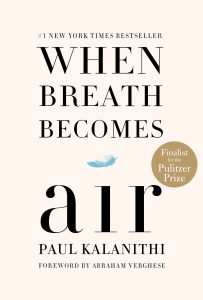Your unofficial summer reading list: The existential crisis edition
By Andi Endruhn, Publishing Editor
Everyone always asks me what I did over the summer, and for at least every year of my university career, the only thing I’ve been able to tell them about is my annual existential crisis.
With too much time on my hands, and no school or serious career to drive me anywhere my thoughts run amok asking all the questions during the year I’m too busy to seriously contemplate. What if I don’t graduate? What if I don’t get a job in my field? What if I do get a job in my field? Where did I put my sandals last winter? What if I never find a hobby I like? Does that mean my life void of meaning? What is meaning in life? Are jobs and hobbies meaning? What if I never find my sandals?
It can all be a bit much, so, instead I read. Albeit, not the fluffy, joyful fiction that fills the checkout lines of grocery stores every season. My tastes in the summer run to the more explosive and idiosyncratic, than what usually appears on the beach reads table at the bookstore, and they tend to read the same way my summer scaries feel.
So if you feel the claws of dread digging into you, or you’re worrying about what it means to be a person making their way on the earth, here’s a reading list that’ll maybe distract you and give you something else to think about while you’re at it.
The Idiot
By: Elif Batuman
Genre: Fiction
Why you should read it: Perhaps the most traditional beach-read out of the list, The Idiot is the story of first year university student Selin, the people she meets, the myth of the college experience and the advent of email.
Borrowing its title from Fydor Dovstoyevsky’s The Idiot, make no mistake Batuman’s 421 page novel’s only similarity is it’s propensity for Russian. Written without chapters, in a dense stream of consciousness The Idiot throws you into the head of 18 year old Selin, and her endless supply of artistic, literary and film references.
By turns hilarious, and touching, The Idiot ingratiates you into the world of someone who hasn’t figured out where life is headed yet, and where she is going — an infinitely relatable sensation for anyone in their post-secondary years, and even beyond.
Autobiography of Red
By: Anne Carson
Genre: Poetry
Why you should read it: A coming of age story in the modern day with characters emerging from Greek myth, Carson explores a search for meaning and belonging in the world through the eyes of a red-winged monster, Geryon. Both a metaphoric and literal monster emerging from Greek mythos into the modern world, and abused by his older brother and left unprotected by his mother, Geryon finds comfort and life through photography and meeting Herakles, a young man who ultimately breaks his heart.
Carson winds the bombastic nature of Greek myth, with the mundane every day. Hockey practice is matched to mythical red-winged monsters, and classic coming of age stories meet the unfathomable feats of Greek heroes.
Describing it as poetry, or as a novel both feel disingenuous to the atmosphere created by Carson’s verse style throughout the book. The structure emphasizes the humour, and the despair found in Geryon’s life and makes it something accessible and enjoyable (if not melancholic) to anyone.
When Breath Becomes Air
By: Paul Kalanithi
Genre: Non-fiction
Why you should read it: A true autobiography this time, When Breath Becomes Air follows the author Paul Kalanithi, at the time finishing his neurosurgical residency, through his diagnosis and battle with late stage metastatic lung cancer.
The ensuing book grapples with the question, what meaning do we have in life when our future goals are no longer accessible? Without the time to move forward, and only the immediate present, what makes life worth living when future milestones are stripped away?
Kalanithi paints lyrical still lifes of moments in his day despite the simple language used, that illustrate his answers to the questions he finds himself facing. Although When Breath Becomes Air inherently deals with our mortality, it dives deep into what is meaningful about living, beyond our goals and successes.
 Blood Meridian, or the Evening Redness in the West
Blood Meridian, or the Evening Redness in the West
By: Cormac McCarthy
Genre: Historical fiction
Why you should read it: Often lauded as Cormac McCarthy’s masterpiece in a literary cannon which contains heavyweight novels such as No Country for Old Men and The Road, Blood Meridian is a sweeping, yet pointed horrifying epic set in 1849, following a teenager only known as “the kid” and his travels through the American southwest with a pack of scalp hunters.
Any quick googling of Blood Meridian will turn up story after story of people who couldn’t finish it, or were subjected to nightmares afterwards. The subject isn’t helped by McCarthy’s style, which takes its cues from biblical and epic sources. Both excruciatingly descriptive, but distant Blood Meridian’s narration fills you with a sense of palpable dread and helplessness as each event passes by.
There is only death, and the brutality and horror of humanity. Yet, the absence of any human good feels highlighted. For every evil committed (and there are a lot) there’s an empty space where a simple act of kindness should be, and in those cracks and gaps, you can find what being truly human — not truly evil — means.







